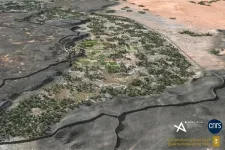(Press-News.org) Diarrhoea is, globally, the second largest cause of death for children under 5. Contributing to more than 500,000 deaths, only pneumonia kills more children each year. Climate change, driving increased flooding and droughts, threatens the fragile progress made in reducing the burden of diarrheal disease over the past decades. Together with the Amsterdam Institute of Global Health and Development, Amsterdam UMC is set to lead a global consortium in the hunt for improved interventions.
"We see that the impact of climate change on diseases transmission depends on the constantly changing interaction between climate events, local vulnerabilities and exposure to disease-causing microorganisms,” says Vanessa Harris, Assistant Professor of Global Health at Amsterdam UMC. "For example, sudden heavy rain can cause sewers to overflow and contaminate water supplies or increasing temperatures can cause some pathogens to live longer outside the body,” Harris adds.
Mapping the terrain
To facilitate effective policy responses in countries that are the most vulnerable to the impacts of climate change, more knowledge is necessary. For Harris’ consortium the initial aim is to understand how climate change’s impact on water supplies and the environment will affects the spread of key pathogens and, thus, the risk of contracting diarrheal disease. "By bridging this knowledge gap, we can map which areas are more at risk and why, allowing communities and policy makers to prepare and adapt locally," says Harris. “We'll do this by bringing together a broad range of experts – from climate experts and engineers to anthropologists, health economists, and public health experts – and then using broad-scale modelling and community-based case studies to describe the consequences of climate change on diarrheal burden and identify which local interventions will be most effective into the future.”
Firsthand experience
Dr. Dzidzo Yirenya-Tawiah and Dr. Adelina Mensah, both environmental scientists at the University of Ghana, have conducted multiple community-based studies and seen the effects of climate change on health first hand.
"Many of our fishing communities are exposed to frequent flooding events from sea level rise, storm surges and erratic rainfall events, which sometimes all occur at the same time and have devastating consequences on infrastructure and water supplies. Quality of surface and groundwater is especially compromised through unknown pathways of disease transmission. With limited alternative resources, health risks are exponentially increased," says Mensah.
Horizon Grant
Ghana is not the only country where case studies will be performed, the consortium will also carry out research in Tanzania, Romania and Italy. In all four countries, case study sites are chosen due to their susceptibility to both flooding and drought. However, there are also individual characteristics that will provide the consortium with unique insights. For example, in Naples, proximity to farming and agriculture, coupled with an ageing urban water infrastructure provides added risks. Haydom, Tanzania is an extremely rural setting with high rates of malnutrition and poverty and increased exposure to food insecurity.
Dr. Estomih Mduma is a Public Health researcher at Haydom Lutheran Hospital and sees how diarrhoea diseases are a major cause of hospital admission, child morbidity and mortality in the hospital. The limited accessibility to water compromises the effort to reduce the burden of diarrhoea in this vulnerable population. These vulnerabilities are part of what the SPRINGS consortium plans to tackle, and thanks to a Horizon grant worth 6.5m euros, the project will draft concrete policies that are ready to be implemented.
"We want to get to the stage where we can predict local and national risks and use this evidence to shape policy. This means understanding where water quality and pathogen surveillance needs to be performed to support communities and governments in prioritising their limited resources across health and environmental sectors. Ultimately, combing better mapping and more surveillance coupled with targeted interventions should reduce illnesses and deaths,” concludes Harris.
The SPRINGS consortium consists of Amsterdam UMC, AIGHD, the Norwegian Meteorological Institute, the University of Virginia, the University of Ghana, the London School of Health and Tropical Medicine, Three o'Clock, Aarhus University, the IHE Delft Institute for Water Education, The Abdus Salam International Centre for Theoretical Physics, the Vrije Universiteit Amsterdam, the University of Naples, the Haydom Lutheran Hospital, AQUATIM, the University of Bucharest and the Dutch National Institute for Public Health and the Environment (RIVM).
END
Tackling the effect of climate change on diarrheal diseases
Thanks to a Horizon Europe grant, Amsterdam UMC together with the Amsterdam Institute for Global Health and Development, is set to lead a global consortium to improve policies and interventions
2024-01-10
ELSE PRESS RELEASES FROM THIS DATE:
Do symptoms of post-traumatic stress disorder facilitate substance use as a coping method among children after a natural disaster?
2024-01-10
In a survey-based study of 3rd to 12th grade students in Puerto Rico after 2017’s Hurricane Maria, certain symptoms of post-traumatic stress disorder (PTSD) were linked with a higher risk of using drugs or alcohol.
The study, which is published in the Journal of Traumatic Stress, included 91,732 youths who completed a survey 5–9 months after Hurricane Maria made landfall in Puerto Rico. Associations between PTSD symptoms and substance use were examined using a network conceptualization, which views disorders as stemming from interactions ...
Microplastics affect soil fungi depending on drought conditions
2024-01-10
Moisture levels in the soil can impact the effects that microplastic pollution has on soil fungi, according to new research published in Environmental Microbiology.
By studying soil samples mixed with microplastics under different conditions, investigators found that when soil is well-watered, toxic chemicals in microplastics can leach into the soil and hinder soil fungal richness. With dry soil, however, the leaching of water-extractable chemicals is less pronounced and therefore less impactful on soil fungal structure.
The researchers also noted that under dry conditions, microplastics help soil hold water for longer, which could help ...
Is a commonly used screening tool for cognitive impairment accurate in diverse populations?
2024-01-10
A screening tool often used in primary care clinics to detect cognitive impairment has shortcomings when applied to ethnically and linguistically diverse older adults, according to a study published in the Journal of the American Geriatrics Society.
The study looked to see whether currently published English and Spanish cut points for cognitive impairment in the Montreal Cognitive Assessment (MoCA) are appropriate in diverse community-based adults aged 65 years or older with cognitive concerns in the Bronx, New York. There were 231 participants (43% ...
Do individual-level mental health interventions improve employees’ wellbeing?
2024-01-10
Many businesses are making efforts to promote workers’ wellbeing, and numerous interventions are available at the individual and organizational levels. New research published in the Industrial Relations Journal found no evidence that individual-level mental wellbeing interventions like mindfulness, resilience and stress management, relaxation classes, and wellbeing apps benefit employees.
The study was based on survey data from 46,336 workers in 233 organizations in the UK. Across multiple subjective wellbeing indicators, participants in individual-level mental wellbeing interventions appeared no better off than other workers.
The study’s ...
Discovery of immense fortifications dating back 4,000 years in north-western Arabia
2024-01-10
The North Arabian Desert oases were inhabited by sedentary populations in the 4th and 3rd millennia BCE. A fortification enclosing the Khaybar Oasis—one of the longest known going back to this period—was just revealed by a team of scientists from the CNRS1 and the Royal Commission for AlUla (RCU). This new walled oasis is, along with that of Tayma, one of the two largest in Saudi Arabia. While a number of walled oases dating back to the Bronze Age had already been documented, this major discovery sheds new light on human occupation in north-western Arabia, and provides ...
Higher viral load during HIV infection can shape viral evolution
2024-01-10
A new paper in Molecular Biology and Evolution, published by Oxford University Press, finds that HIV populations in people with higher viral loads also have higher rates of viral recombination. In effect, the more HIV in the blood, the easier it is for the virus to diversify.
One of the reasons HIV has historically been so difficult to combat is the virus’s exceptionally high rate of recombination. Recombination enables the exchange of genetic information across strains of the virus and drives HIV’s evolution within people. This genetic exchange ...
More than 900 chemicals, many found in consumer products and the environment, display breast-cancer causing traits
2024-01-10
With tens of thousands of synthetic chemicals on the market, and new ones in development all the time, knowing which ones might be harmful is a challenge both for the federal agencies that regulate them and the companies that use them in products. Now scientists have found a quick way to predict if a chemical is likely to cause breast cancer based on whether the chemical harbors specific traits.
“This new study provides a roadmap for regulators and manufacturers to quickly flag chemicals ...
Agility in cultural heritage management—Advancing competence within uncertainty as a sustainable and resilient adaptation to processes of dynamic change
2024-01-10
The intense changes in our modern society and the associated challenges are constantly increasing, not least due to the meta-crisis of climate change. Yet our approach to cultural heritage is still strongly influenced by the narrative of preservation. The article aims to find solutions within the interplay of preservation and change. Based on the psychological impact on society resulting from the current challenges, it is argued that cultural heritage experts need competencies in dealing with uncertainty and tolerance of ambiguity in order to provide security of action. The article applies insights from multiple disciplines to urban environment studies and advocates for a systemic understanding ...
Prestigious American Historical Review showcases UT class where video games meet history
2024-01-10
Tore Olsson put his students in touch with American history through his popular and award-winning class “Red Dead America: Exploring America’s Violent Past Through the Hit Video Games.” Now this engagement has reached beyond the classroom—the historical profession’s most prestigious journal, the American Historical Review, just published a major feature on the class as an example of creative and innovative history teaching.
Olsson is an associate professor and director of graduate studies in UT’s Department of History. His focus as a historian is the United States since the Civil War, with a particular interest in the US South, ...
Observing single protein with infrared nanospectroscopy
2024-01-10
Infrared vibrational spectrum of a single protein is observed using advanced measurement techniques based on near-field optical microscopy. This method utilizes light confined at the nanometer scale, allowing for the detailed analysis of extremely small samples, which was previously challenging with conventional infrared spectroscopy. The achievement represents a major advancement towards technological innovations such as ultra-sensitive and super-resolution infrared imaging, as well as single-molecule vibrational spectroscopy.
Infrared ...
LAST 30 PRESS RELEASES:
Alkali cation effects in electrochemical carbon dioxide reduction
Test platforms for charging wireless cars now fit on a bench
$3 million NIH grant funds national study of Medicare Advantage’s benefit expansion into social supports
Amplified Sciences achieves CAP accreditation for cutting-edge diagnostic lab
Fred Hutch announces 12 recipients of the annual Harold M. Weintraub Graduate Student Award
Native forest litter helps rebuild soil life in post-mining landscapes
Mountain soils in arid regions may emit more greenhouse gas as climate shifts, new study finds
Pairing biochar with other soil amendments could unlock stronger gains in soil health
Why do we get a skip in our step when we’re happy? Thank dopamine
UC Irvine scientists uncover cellular mechanism behind muscle repair
Platform to map living brain noninvasively takes next big step
Stress-testing the Cascadia Subduction Zone reveals variability that could impact how earthquakes spread
We may be underestimating the true carbon cost of northern wildfires
Blood test predicts which bladder cancer patients may safely skip surgery
Kennesaw State's Vijay Anand honored as National Academy of Inventors Senior Member
Recovery from whaling reveals the role of age in Humpback reproduction
Can the canny tick help prevent disease like MS and cancer?
Newcomer children show lower rates of emergency department use for non‑urgent conditions, study finds
Cognitive and neuropsychiatric function in former American football players
From trash to climate tech: rubber gloves find new life as carbon capturers materials
A step towards needed treatments for hantaviruses in new molecular map
Boys are more motivated, while girls are more compassionate?
Study identifies opposing roles for IL6 and IL6R in long-term mortality
AI accurately spots medical disorder from privacy-conscious hand images
Transient Pauli blocking for broadband ultrafast optical switching
Political polarization can spur CO2 emissions, stymie climate action
Researchers develop new strategy for improving inverted perovskite solar cells
Yes! The role of YAP and CTGF as potential therapeutic targets for preventing severe liver disease
Pancreatic cancer may begin hiding from the immune system earlier than we thought
Robotic wing inspired by nature delivers leap in underwater stability
[Press-News.org] Tackling the effect of climate change on diarrheal diseasesThanks to a Horizon Europe grant, Amsterdam UMC together with the Amsterdam Institute for Global Health and Development, is set to lead a global consortium to improve policies and interventions



